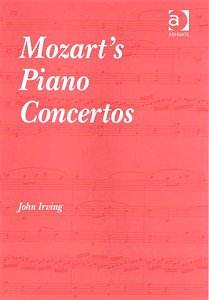Mozart's piano concertos
are amongst his most enduringly popular
works. The later pieces in particular
have an eternally romantic (or romanticisable)
aspect that kept them in the affection
of the public when other more classically
formed works fell away. Concertos 17,
20, 21, 23-25 and 27 are likely to be
among the list of favourites of anyone
who has any feeling for Mozart's music.
Rather like Wagner
and Elgar much has been written about
Mozart and books on musical exegesis
are not in short supply. This one stands
out because of its exclusive focus on
the piano conceertos although as is
noted in the preface it is by no means
the first book to do so.
There is a touching
reference in the Preface to the reason
why John Irving researched the concertos.
His late father Alan Irving had Mozart's
music as a particular favourite and
held these concertos in special affection.
The book is decidedly
for the technical expert, the researcher
and the performer/conductor. The origins
of the concertos are examined in a chapter
that delves into the early works, making
links with the aria and vocal traditon.
Over three chapters the movement forms
are examined: first, middle and finale.
Mozart distinguished
between the the connoisseur and general
listener. He recognised how his music
appealed to both and presumably structured
it to do so. In a chapter dedicated
to performance considerations Irving
sides with the fortepiano as the instrument
of concert choice. This treatment concludes
the 170 pages of the first part.
The second part comprises
a 'Register' consisting of a chapter
each for KK 175, 238, 242, 246, 271,
365, 413-415, 449-451, 453, 456, 459,
466, 467, 482, 488, 491, 503, 537 and
595. The approach is analytical and
alternative editions are considered.
Attention is also given to orchestral
parts. The academically slanted detail
of the book is reflected in extensive
footnoting.
This strikes me as
a most through and recommendably detailed
study by an author already deeply and
authoritatively and lovingly immersed
in his subject. I note that Mr Irving
has previously written books and articles
on the Mozart piano sonatas and Mozart's
'Haydn' quartets.
Recommended for academics,
and as a handbook for practising musicians.
Others with a more general interest
in the concertos may find this too tehnically
detailed though I daresay they will
learn much from it.
Rob Barnett
